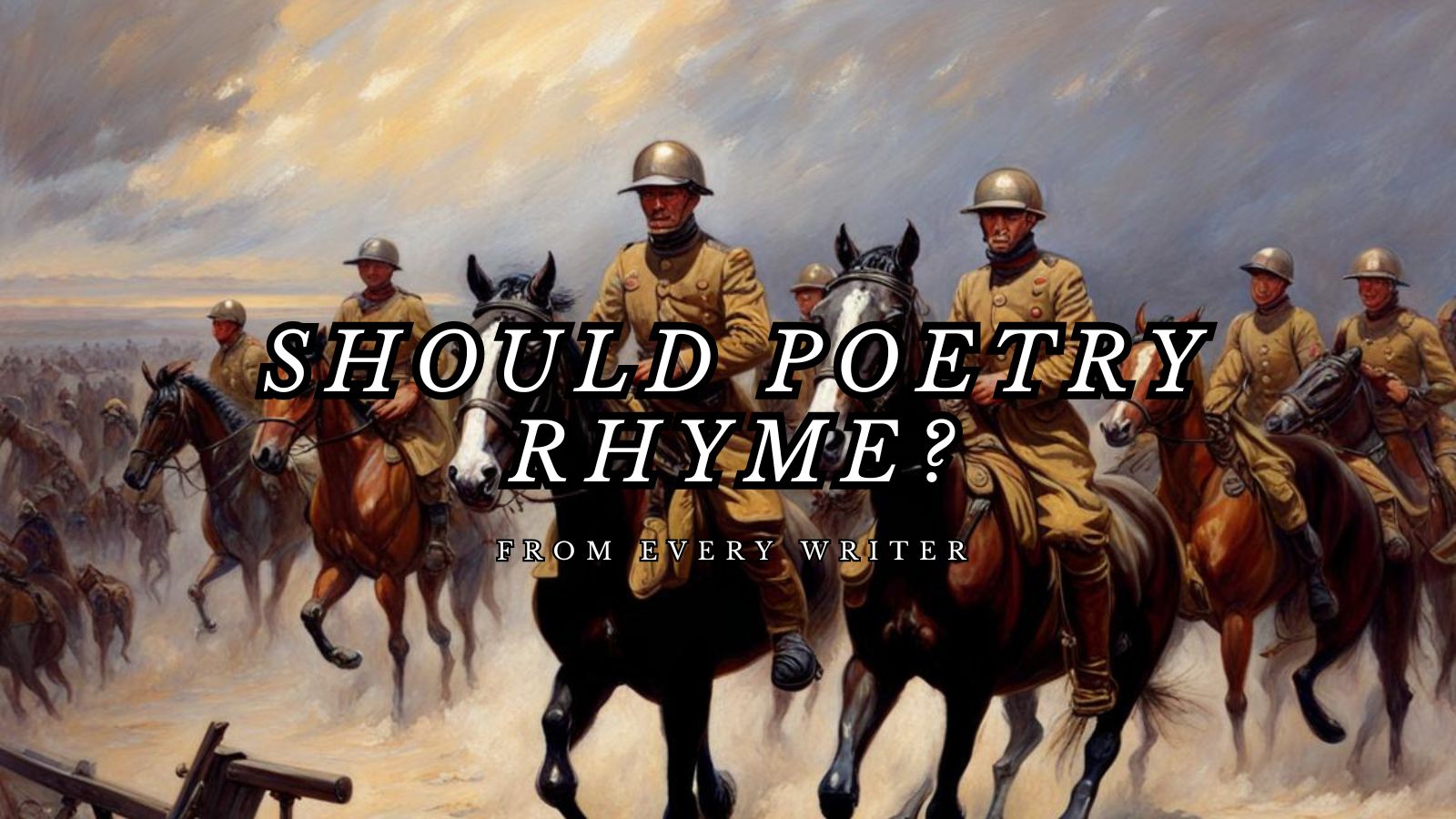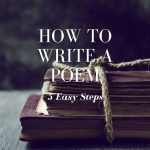Should Poetry Rhyme?
Does poetry have to rhyme? Should it rhyme? Let’s start by saying there is no should in poetry. A poet can write poetry in any way they want, and no one has the right to tell them if it is correct or incorrect. This all goes without saying. Should poetry rhyme? There might be better questions to ask here. I think many new poets might ask, “Is rhyming poetry popular?” or “Can rhyming poetry be published?” The answer is complicated. At one time, poetry was expected to rhyme and have structure. Now, it is not a given. Now, you need a reason for the structure and a reason for the rhyme. Does this mean you should NOT write rhyming poetry? Of course not; you should write whatever poetry moves you, but it may be hard to get that poetry out there and published by some editors. When did rhyming poetry become less fashionable? When did it change?
To Rhyme or Not to Rhyme, that was and is the question.
The Romantics, roughly from 1800 to 1880, were all about rhyme and structure in poetry. People like Longfellow and Wordsworth held up centuries of conventions in poetry. There are so many different structures they employed to write poetry. Many of these poems are in our “Types of Poetry” article. These poets were deeply concerned with things like rhyme and meter and using poetry structures to give their world more meaning. One of the most significant examples of this was war poetry. War up until the 1900s was well organized, functioned with abundant rules and was even considered gentlemanly. We are ignoring some of the tactics of the Americans in their revolution here. War was, at this time, still courageous and “exciting.”
You can see the best example in the poem Charge of Brigade by Alfred Lord Tennyson, written in 1854, about the actual events of the British Light Cavalry taking on Russian forces. It is a courageous and daring story, but the Light Brigade suffered heavy losses. Tennyson’s poem was published just a few weeks after the battle and romanticized the fight, but warfare was changing. Soon, this same type of bravery would only result in death as a good visualization of the futility of this kind of change happens in War Horse:
These deaths do not seem brave or romantic. They seemed pointless. No one wants to romanticize or employ “fancy” structures (nods to the romanticism of the past) when everyone is dying in ever increasingly horrible ways.
The War Poets
Many poets fought in WWI: The War to End All Wars, but two in particular became enormously influential after the war, Wilfred Owen and Siegfried Sasson. Owen was only 25 years old when he was killed in battle and wrote what could be considered the manifesto poem of this movement, Dulce et Decorum Est. The poem takes the old saying from 2000 years ago, “It is sweet and fitting to die for one’s country,” and exposes it as a lie.
These poets are still using the ways of the romantic, but their structures and rhymes just make things more grim, like in Suicide in the Trenches. Sasson’s poetry greatly influenced TS Eliot and other poets of the modern movement.
The moderns
After WWI, the modern movement led by TS Eliot became the default for what we think of poetry today. These poets employed structures in poetry only to destroy them. They mocked the past with gritty realism in their poems. Yeats and Eliot made many things possible in poetry that were impossible before. Their grim realism, cued in many ways by the war poets, changed poetry, but the structures were still there.
The Imaginists
At the same time that the war poets and the moderns (many feel the Imaginists were part of the modern movement), the Imaginist William Carlos Williams was writing. He didn’t get a lot of attention at the time. Williams’ poetry was nothing like poetry at the time at all. It was just writing like his famous poem:
This is Just to Say
by William Carlos Williams
This Is To Say
I have eaten
the plums
that was in
the icebox
and which
you were probably
saving
for breakfast
Forgive me
they were delicious
so sweet
Only a few poems had been written like this at the time. Williams dispelled everything known about poetry for centuries, but the world changed after WWI. William Carlos Williams was ahead of his time. For the next 40 years and through WWII, poetry would change until it finally landed on the Beats.
The Beats
World World I taught poets not to be romantic about war and life, and World War II taught them all bets were off. The Beats were anti structure, anti society, anti conventions. They were the rebels of writing and poetry. William Carlos Williams’ writing became very popular among them. This movement destroyed the rest of the justification of rhyming and structure in poetry. It made poetry about feeling and passion. Writers like Jack Kerouac, Allen Ginsberg, William Blake, and Diane di Prima changed poetry. This changed the default of poetry from rhyme and structure to free verse. Passion was their only rule.
Contemporary Poetry
After all the work to dispel the structures of poetry and turn to passion, asking Should Poetry Rhyme seems a little empty. At one time, rhyme and structure in poetry were expected. All the struggling factions of the 20th century have morphed this question into, Why Does it Rhyme? Why are you using that structure? Like everything else in writing, there should be a reason for doing that.
Editors today
I know some editors who are very much turned off by rhyming poetry. They will publish it, but they shy away from it. That’s the best way to say it. If there is an apparent reason for the rhyme, the poem follows a structure, like a sonnet or a sestina, for example, then it gives the poet credibility. There are people, poets, and nonpoets out there who feel like all poetry should rhyme. They grew up on the classics and don’t understand how poetry can be written without structure and rhyme. The answer is above. Poets fought for years and years to make poetry accepted regardless of its structure, so if you are rhyming just because you think poetry should rhyme, you are ignoring generations of great poets who fought conventions to bring poetry into the 21st century.
So let us know your thoughts in the comments. Do you prefer rhyming poetry?
- 100 Screenwriting Ideas to Get You Writing - January 20, 2026
- 100 Winter Storm Writing Prompts - January 17, 2026
- 100 Haunted House Story Starters: Craft Your Scariest Tale Yet - January 10, 2026




